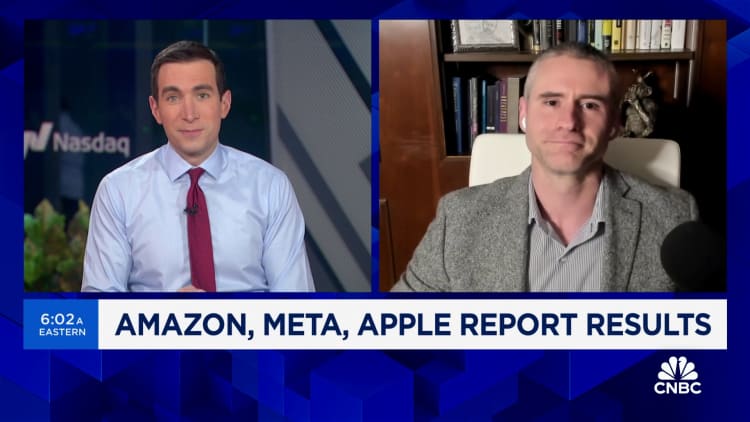Apple CEO Tim Cook listens during a program at the Asia-Pacific Economic Cooperation (APEC) Leaders’ Week at Apple Park in San Francisco, Nov. 17, 2023.
Andrew Caballero-Reynolds | AFP | Getty Images
Apple is facing renewed challenges in China, one of its most critical markets.
The iPhone giant’s sales in the greater China region in the December quarter fell nearly 13% to $20.8 billion.
China was once seen as the major growth driver for the company but last year, cautious consumer sentiment combined with intense competition, in particular from a rejuvenated Huawei, posed a challenge to the Cupertino-based giant. And in 2024 it may not get any better.
“Two key factors were holding Apple back in 4Q23 — a more cautious and rational spending sentiment and the challenge from Huawei which created more buzz in the market than the new iPhone 15 series,” Will Wong, senior research manager at IDC, told CNBC.
“We don’t expect the iPhone’s shipment growth to return to positive territory in 2024 in China, with Huawei expected to remain the key competitor while more advanced technologies like AI and foldable grabbing more attention from consumers.”
So what challenges does Apple face in the world’s second-largest economy?
Huawei comeback
Last year, Huawei launched a smartphone called the Mate 60 which had 5G connectivity.
This was a major surprise to the world. The reason is that in 2019 and 2020, the U.S. government hit Huawei with a number of sanctions that cut it off from the chips and technology required for 5G, which is next-generation mobile internet that promises super-fast downloads.
The sanctions, which also restricted Huawei’s access to Google software, effectively crippled the Chinese technology giant’s handset business.
Huawei, which was once the world’s largest smartphone player, was really the only major challenger to Apple in China in the high-end of the market. Once Huawei’s phones lost their competitiveness due to the lack of 5G and no cutting-edge semiconductors, customers flocked to iPhones.
Now with the Mate 60, Huawei is seeing the early signs of a revival.
“The resurgence of Huawei in [the] premium market, is attracting back the Huawei defectors who switched to Apple as Huawei couldn’t release a 5G smartphone over the last three years,” Neil Shah, partner at Counterpoint Research, told CNBC.
In the fourth quarter of 2023, Huawei returned to the list of top five smartphone makers in China.
High-end competition
It is not just Huawei that is challenging Apple. Other domestic brands from Xiaomi to Oppo have been slowly pushing into the high-end market but at cheaper prices.
“These high-end devices are not only competitively priced, starting predominantly at 3,999 RMB ($563) but also boast features akin to those found in premium smartphones,” Shah said.
“This increased competition exerts pressure on both Apple’s older models and the base models of its new series.”
Cautious consumer
Last year, the Chinese economy faced a number of challenges from collapses in its property sector to weak consumer demand.
These challenges could continue into 2024 and affect consumer confidence.
If the Chinese consumer remains weak, those cheaper high-end models could be attractive.
“I think what you’re seeing in China is an economically-effected consumer who is weary about their own personal consumption and thinking to themselves, ‘I don’t need to pay up for this phone when I can just get a cheaper version of it’,” Josh Koren, founder at Musketeer Capital Partners, told CNBC’s “Street Signs Europe” on Friday.
Is Apple no longer cool?
For a long time, Apple has been seen as a luxury brand in China with high appeal among younger audiences. That may be changing, according to one analyst.
“I just think that the Apple brand doesn’t have that luster any more, it doesn’t have that reputation among Gen Z,” Koren said.
While many competitors from Samsung to Honor have launched foldable smartphones, Apple has resisted.
It is often not first to market with new products and waits to see if a category takes off. Many smartphone makers are also talking up artificial intelligence features on their devices, something Apple hasn’t done yet either.

This has led many to question Apple’s innovation in the smartphone arena. Koren suggested this may be one reason Apple’s brand is suffering.
“I think that until Apple can innovate to the point where they can bring the reputation back that having the iPhone is a must have, it is going to be difficult,” Koren said.
Geopolitics
And like many foreign technology firms operating in China, the specter of geopolitics constantly hangs over.
Bloomberg, citing people familiar with the matter, reported last year that China has extended a ban ordering staff at government agencies and state-backed firms to stop bringing iPhones and other foreign devices to work.







